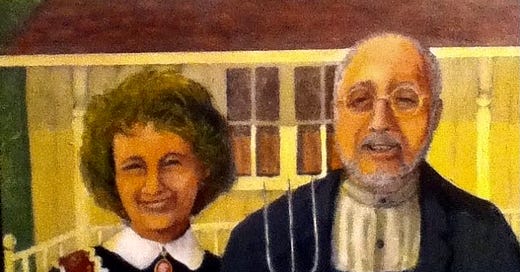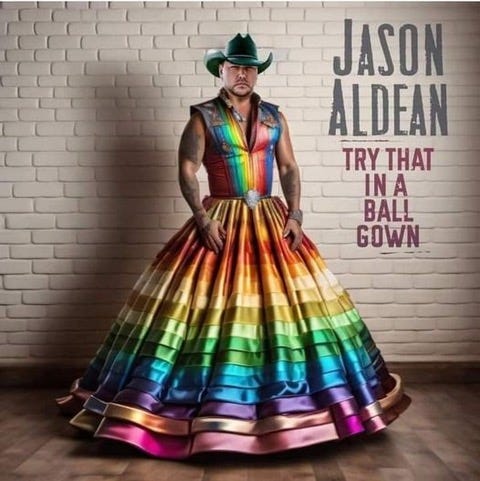Fern: I went to college at a state university in upstate New York. Tuition was cheap. There weren’t any “legacy” admissions. Just lots of kids from Long Island, some with state scholarships. And yet, there was a class distinction between the “townies” and the college students. At the end of the Sixties and early Seventies there was real tension and division. You remember that, don’t you, old guy?
Joe: Fifty years ago, if a guy walked into a bar in a small town with long hair, wearing Birkenstocks, maybe a peace sign sewn on his jeans, there was likely to be trouble. There was a kind of class war. Which mirrored the real war in Vietnam.
Fern: College students who kept their grades up had student deferments. So the resentments seemed authentic. What are the resentments now?
Joe: You name it. Books. Guns. Sexual identity. Bud-Lite. The Supreme Court. The political divisions are amplified by social media. Red and Blue have never been more clearly defined.
Fern: Look at a political map of Iowa. What are Democratic strongholds?
Joe: Is this a test?
Fern: Well, in Iowa, there is a majority of Democrats here in Story County. Des Moines. Johnson County (the University of Iowa). Liberal strongholds are university towns and cities with more diverse populations.
Joe: Ok. So one urban area and two college towns in Iowa vote democratic. What does that mean? I think you’re about to tell me.
Fern: College towns and urban areas are more progressive than less populated areas. Despite attempts at gerrymandering.
Remember when we went on road trips throughout small-town Iowa years ago? That’s when I came home and thought that Trump could very well win the presidency. Even though the rational person in me thought: how can that even be possible?
Joe: It was. And the divisions got even fiercer.
Fern: Which leads us to the discussion of the song: Try That in a Small Town. The one that’s causing so much controversy now. You’ve heard it.
Joe: You asked me to listen to it. Twice. Before we started writing this. I’m still not sure why.
Fern: Well, first because I listened to it a couple of times just to understand what all the hoopla was about. And because I actually like country and western music. Songs that tell a story. Also because they are lots of strong women, singing their hearts out: Patsy Kline, Loretta, Lucinda Williams , the Judds. The Dixie Chicks . . . shame on what happened to them.
And Dolly Parton. I mean who in the world doesn’t love Dolly?
Joe: To me, the good thing about country music is that I can understand the lyrics.
And the words do speak to people. I knew a therapist once who was divorced and he told me that for a year after his divorce, he couldn’t listen to country music because it all sounded like it was written just for him.
Fern: So: Try That in a Small Town. It’s catchy. And a big hit after starting an even bigger controversy. Is it a racist song? It is promoting violence?
Singer Jason Aldean typifies a specific brand of macho that infuses country music: Pickup trucks. Guns. Patriotism. The song is not against stoned, peaceful hippies this time. But criminals ravishing our cities. Car-jacking little old ladies. But those in a small town are “ good old boys who were raised up right.”
Now people are asking if the song is racist? I don’t know. There’s clips of riots and protests, of cities going up in flames. But there are no black people in the videos I saw.
Joe: I read that some of it was edited out.
Fern: But there’s certainly the threat. It’s not a warm, fuzzy presentation of small towns. It’s guns. And a call to vigilantes for protection.
Joe: From what?
Fern: Well – in the video it’s from crime coming in from “outsiders.” And the threat to “See how far ya make it down the road.”
In an interview, Aldean said: the song refers to the feeling of a community that I had growing up, where we took care of our neighbors, regardless of differences of background or belief. Because they were our neighbors, and that was above any differences.
Joe: Bullshit detectors going off! That’s kind of ingenuous. The actual message is: don’t be different in a small town. Which is one of the reasons that people don’t stay in a small town.
Fern: BTW – speaking of macho, I was surprised you wanted to go to that Barbie movie with me.
Joe: Why wouldn’t I? It was directed by an artist whose work I enjoy and respect. Same goes for her co-writer husband. Why would I not want to go? I’m a father of daughters. There’s real suffering under all that pink.
At my old age now I can hardly get through the evening news without getting choked up. And it’s not just the suffering and pain -- there’s all the courage, too, the day-to-day courage. What courage it took to make a funny yet serious movie called Barbie and work with the manufacturer whom you caricature.
I loved the movie and I’m not a bit ashamed to admit that I had tears in my eyes at the end. We have daughters. Part of being a good father is trying to understand how they negotiate in the world. And I’m thankful for them to have opportunities and a broader knowledge of the world than can be found in a small town.
Fern: Wow. I have nothing left to say.
Joe: First time, ever.
If you’re interested in commentary by some of Iowa’s best writers, please follow the Iowa Writers’ Collaborative members:
Laura Belin: Iowa Politics with Laura Belin, Windsor Heights
Doug Burns: The Iowa Mercury, Carroll
Dave Busiek: Dave Busiek on Media, Des Moines
Steph Copley: It Was Never a Dress, Johnston
Art Cullen: Art Cullen’s Notebook, Storm Lake
Suzanna de Baca: Dispatches from the Heartland, Huxley
Debra Engle: A Whole New World, Madison County
Julie Gammack: Julie Gammack’s Iowa Potluck, Des Moines and Okoboji
Joe Geha: Fern and Joe, Ames
Jody Gifford: Benign Inspiration, West Des Moines
Nik Heftman: The Seven Times, Los Angeles and Iowa
Beth Hoffman: In the Dirt, Lovilla
Dana James: New Black Iowa, Des Moines
Pat Kinney: View from Cedar Valley, Waterloo
Fern Kupfer: Fern and Joe, Ames
Robert Leonard: Deep Midwest: Politics and Culture, Bussey
Letters from Iowans, Iowa
Tar Macias: Hola Iowa, Iowa
Kurt Meyer: Showing Up, St. Ansgar
Wini Moranville, Wini’s Food Stories, Des Moines
Kyle Munson, Kyle Munson’s Main Street, Des Moines
Jane Nguyen, The Asian Iowan, West Des Moines
John Naughton: My Life, in Color, Des Moines
Chuck Offenburger: Iowa Boy Chuck Offenburger, Jefferson and Des Moines
Barry Piatt: Piatt on Politics Behind the Curtain, Washington, D.C.
Dave Price: Dave Price’s Perspective, Des Moines
Macey Spensley: The Midwest Creative, Iowa
Larry Stone: Listening to the Land, Elkader
Mary Swander: Mary Swander’s Buggy Land, Kalona
Mary Swander: Mary Swander’s Emerging Voices, Kalona
Cheryl Tevis: Unfinished Business, Boone County
Ed Tibbetts: Along the Mississippi, Davenport
Teresa Zilk: Talking Good, Des Moines
To receive a weekly roundup of all Iowa Writers’ Collaborative columnists, sign up here (free): ROUNDUP COLUMN
We are proud to have an alliance with Iowa Capital Dispatch.





You two get better every time you write! Thanks for letting us listen in on your conversations. I’m thinking I might want to come up and cover one of your chats, so I could write about the out-takes.